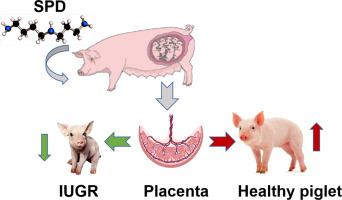Maternal supplementation spermidine during gestation improves placental angiogenesis and reproductive performance of high prolific sows
IF 4.9
2区 医学
Q1 BIOCHEMISTRY & MOLECULAR BIOLOGY
引用次数: 0
Abstract
Spermidine (SPD) is a widely recognized polyamine compound found in mammalian cells and plays a key role in various cellular processes. We propose that SPD may enhance placental vascular development in pregnant sows, leading to increased birth weight of piglets. Six hundred and nine sows at 60 days of gestation were randomly assigned into a basal diet (CON group), basal diet supplemented 10 mg/kg of SPD (SPD1 group), and basal diet supplemented 20 mg/kg of SPD (SPD2 group), respectively. Compared with the CON, SPD1 significantly increased the average number of healthy piglets per litter and the placental efficiency (P < .05), while the average number of mummified fetus per litter and the percentage of weak piglets significantly decreased (P < .05). In the plasma metabolomics, SPD content in plasma of sows (P = .075) and umbilical cord plasma of piglets (P = .078) had an increasing trend in response to SPD1. Furthermore, SPD1 increased the expression of the vascular endothelial cell marker protein, platelet endothelial cell adhesionmolecule-1 (PECAM-1/CD31) and the density of placental stromal vessels (P < .05). Moreover, as compared to CON, SPD2 significantly decreased the average number of mummified fetus per litter (P < .05), while the placental efficiency and the expression of amino acid transporter solute carrier (SLC) family 7, member7 (SLC7A7) and glucose transporters SLC2A2) and SLC5A4 in placental tissue significantly increased (P < .05). These results suggest that maternal supplementation of SPD during pregnancy increased healthy litter number, and promoted placental tissue development. Our findings provide evidence that maternal SPD has the potential to improve the production performance of sows.

母体在妊娠期间补充 Spermidine 可改善高产母猪的胎盘血管生成和繁殖性能。
精胺(SPD)是一种广泛存在于哺乳动物细胞中的多胺化合物,在各种细胞过程中发挥着关键作用。我们认为,SPD 可促进妊娠母猪胎盘血管的发育,从而提高仔猪的出生体重。我们将妊娠 60 天的六百零九头母猪随机分为基础日粮(CON 组)、添加 10 毫克/千克 SPD 的基础日粮(SPD1 组)和添加 20 毫克/千克 SPD 的基础日粮(SPD2 组)。与对照组相比,SPD1组显著提高了平均每窝健康仔猪数和胎盘效率(P < 0.05),而平均每窝木乃伊胎数和弱仔猪百分比显著降低(P < 0.05)。在血浆代谢组学中,母猪血浆(P = 0.075)和仔猪脐带血浆(P = 0.078)中的 SPD 含量在 SPD1 的作用下呈上升趋势。此外,SPD1 还能增加血管内皮细胞标记蛋白、血小板内皮细胞粘附分子-1(PECAM-1/CD31)的表达和胎盘基质血管的密度(P < 0.05)。此外,与CON相比,SPD2显著降低了每胎木乃伊胎儿的平均数量(P<0.05),而胎盘效率和胎盘组织中氨基酸转运体溶质运载体(SLC)家族7成员(SLC7A7)、葡萄糖转运体SLC2A2和SLC5A4的表达量显著增加(P<0.05)。这些结果表明,母体在孕期补充 SPD 可增加健康产仔数,并促进胎盘组织的发育。我们的研究结果证明,母体补充 SPD 有可能提高母猪的生产性能。
本文章由计算机程序翻译,如有差异,请以英文原文为准。
求助全文
约1分钟内获得全文
求助全文
来源期刊

Journal of Nutritional Biochemistry
医学-生化与分子生物学
CiteScore
9.50
自引率
3.60%
发文量
237
审稿时长
68 days
期刊介绍:
Devoted to advancements in nutritional sciences, The Journal of Nutritional Biochemistry presents experimental nutrition research as it relates to: biochemistry, molecular biology, toxicology, or physiology.
Rigorous reviews by an international editorial board of distinguished scientists ensure publication of the most current and key research being conducted in nutrition at the cellular, animal and human level. In addition to its monthly features of critical reviews and research articles, The Journal of Nutritional Biochemistry also periodically publishes emerging issues, experimental methods, and other types of articles.
文献相关原料
公司名称
产品信息
上海源叶
标准溶液
 求助内容:
求助内容: 应助结果提醒方式:
应助结果提醒方式:


